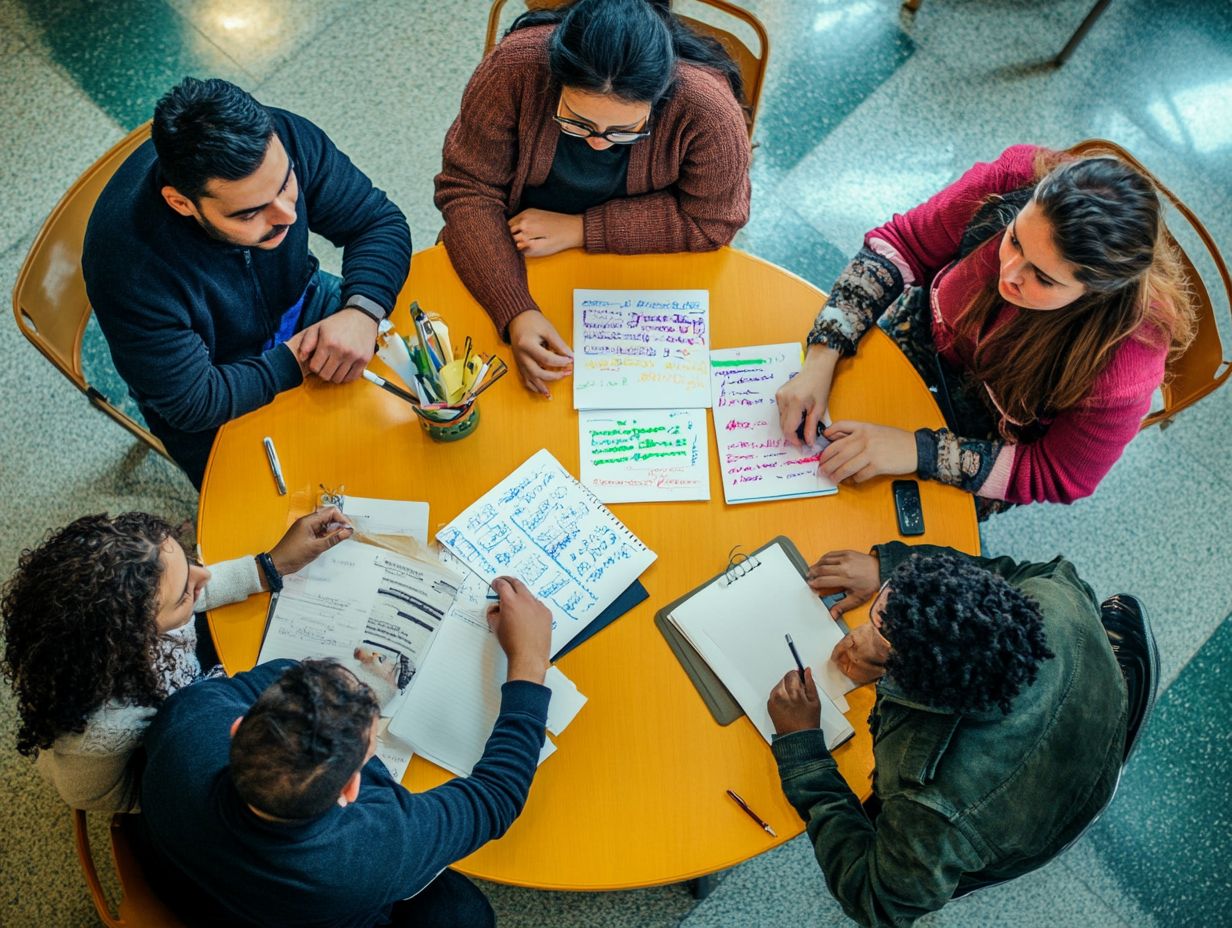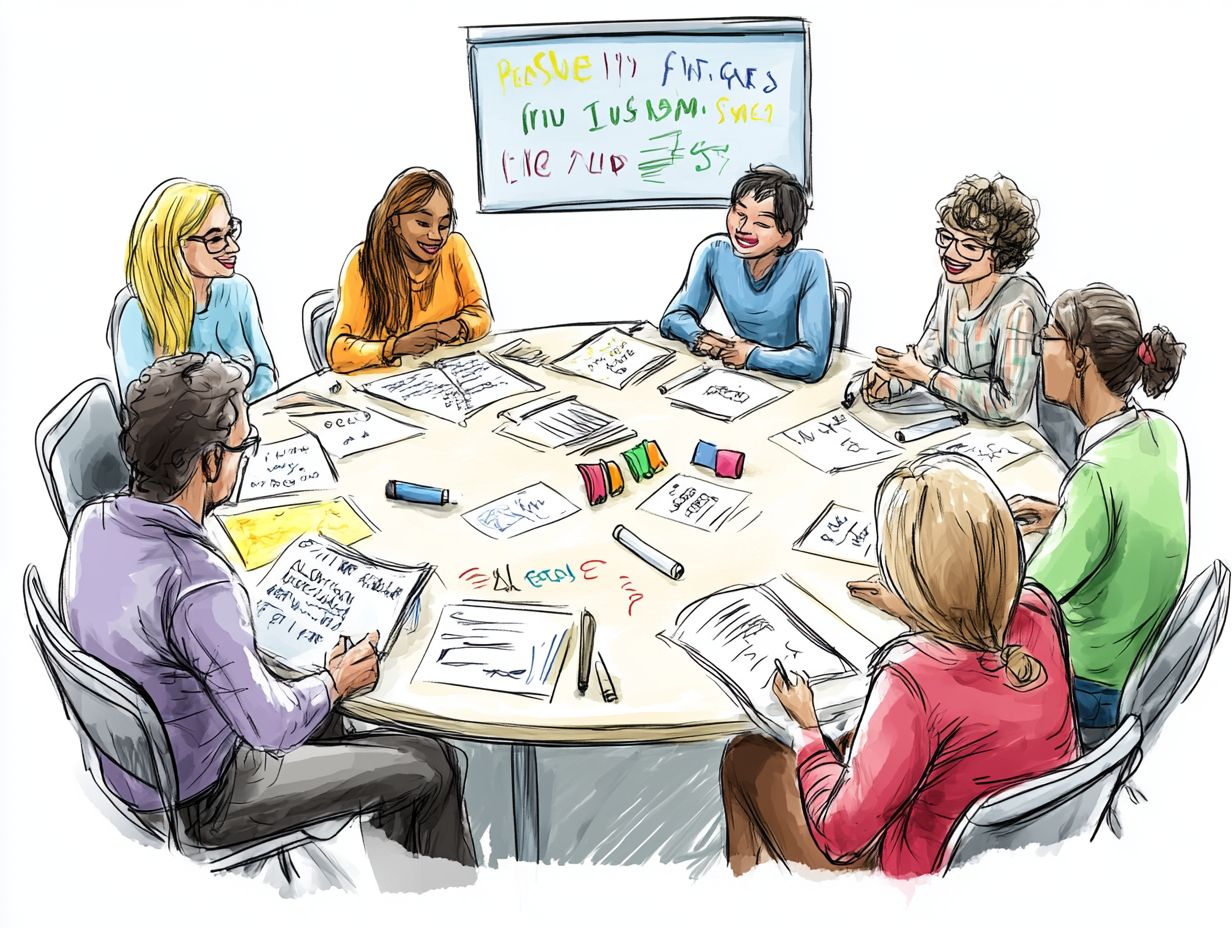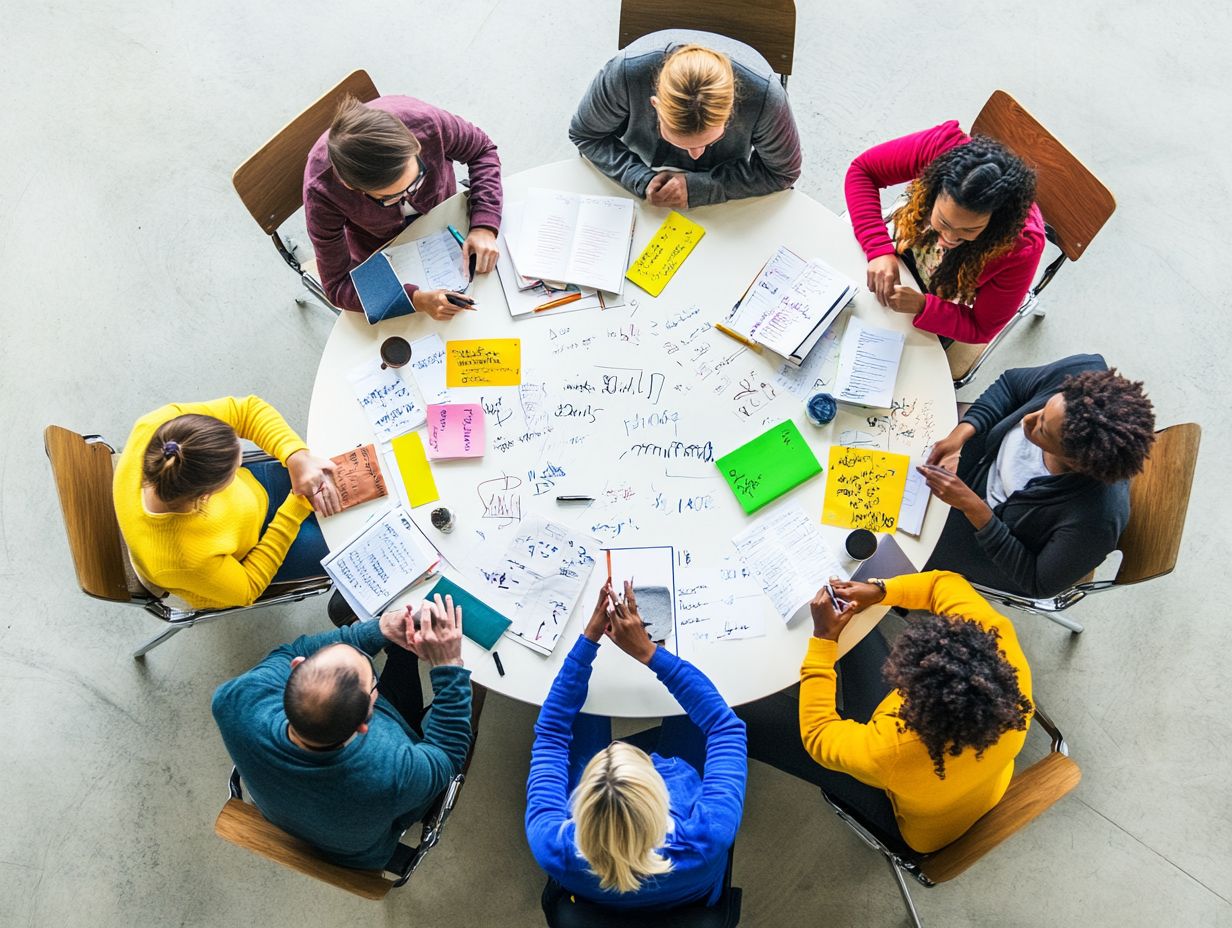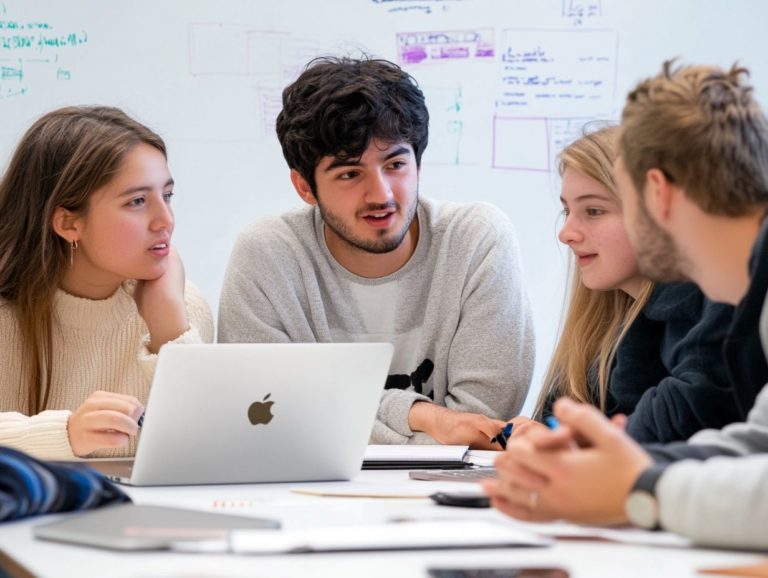7 tips for effective language learning in groups
Learning a new language might seem overwhelming at first, but engaging in group settings can turn this challenge into an exciting and enjoyable journey.
Here are seven essential tips to elevate your language acquisition through group learning. By establishing clear goals and fostering a sense of community and collaboration, each strategy is crafted to cultivate a supportive environment where everyone can flourish.
Whether you re teaching or learning, grasping the dynamics of group learning can open doors to new opportunities for growth and success in mastering a language. Explore how to make your group learning experience not just effective, but truly enjoyable!
Contents
- Key Takeaways:
- 1. Establish Clear Goals and Objectives
- 2. Create a Supportive and Inclusive Environment
- 3. Utilize Group Activities and Games
- 4. Encourage Regular Practice and Review
- 5. Incorporating Different Learning Styles
- 6. Provide Feedback and Constructive Criticism
- 7. Creating a Vibrant Community
- How Can Group Learning Enhance Language Acquisition?
- What Are the Challenges of Learning a Language in a Group?
- What Are the Benefits of Learning a Language in a Group?
- How Can Group Dynamics Affect Language Learning?
- What Are Some Effective Group Learning Strategies?
- How Can a Language Teacher Facilitate Group Learning?
- What Are Some Common Mistakes to Avoid in Group Language Learning?
- Frequently Asked Questions
- What are the benefits of learning a language in a group?
- How can I motivate myself to continue learning in a group setting?
- What should I do if I am struggling to keep up with the group’s pace?
- How can I make the most out of group discussions and activities?
- Is it important to practice outside of group meetings?
- How can I handle conflicts or disagreements within the group?
Key Takeaways:

- Establish clear goals and objectives to stay focused and motivated.
- Create a supportive and inclusive environment to encourage participation.
- Utilize group activities and games to make learning fun and engaging.
1. Establish Clear Goals and Objectives
Establishing clear goals and objectives is essential in your language learning journey. It provides your study with direction and motivation, enabling you to track your progress and celebrate your achievements as you acquire a second language.
By breaking down your learning into specific, measurable, achievable, relevant, and time-bound (SMART) objectives, you can create a structured and purposeful approach to your studies.
For instance, a short-term goal could be mastering basic conversational phrases within a month, while a long-term objective might aim for reaching fluency in two years. This systematic strategy not only enhances your engagement but also plays a significant role in achieving fluency.
You ll be able to measure your improvements over time and adjust your study plans as needed. Clarity in your goals fosters a sense of accomplishment and fuels your motivation to keep progressing.
2. Create a Supportive and Inclusive Environment
Creating a supportive and inclusive environment is crucial for your language learning journey. It helps you feel good emotionally and gives you the power to engage with the material without the fear of making mistakes.
Feeling valued helps you understand your own feelings and those of others. This lets you express yourself more freely and engage positively with your peers. This nurturing atmosphere can significantly enhance your ability to absorb new concepts and vocabulary, leading to improved retention and application.
Incorporating different viewpoints and materials makes sure everyone feels included. Educators can provide regular, constructive feedback that focuses on your growth rather than criticism, helping to build your confidence.
3. Utilize Group Activities and Games
Get ready for fun! Group activities and games can supercharge your language learning journey. Engaging in interactive experiences like word bingo or vocabulary charades invites you to dive into new terms in a lively and enjoyable way.
Cooperative storytelling and role-playing exercises can greatly enhance your grammar and conversational skills, allowing you to practice constructing sentences and expressing ideas in real time.
Activities such as group debates serve as an excellent platform for you to articulate your thoughts, consider diverse perspectives, and strengthen your sense of community.
Laughing together and facing challenges creates a strong bond, making your language journey exciting. These collective experiences not only deepen your understanding but also nurture relationships, making your journey of language acquisition truly enriching.
Ready to start your language learning adventure? Gather your group and dive in today!
4. Encourage Regular Practice and Review
Regular practice and review are important parts of your language-learning journey. They reinforce your knowledge, aid memorization, and cultivate fluency through consistent exposure to new material.
Incorporating techniques like spaced repetition the practice of reviewing information over increasing intervals can help you remember information better.
Self-testing helps you assess your progress and pinpoint areas needing more focus. This fosters a sense of ownership over your educational path.
Participating in collaborative review sessions with peers enriches your experience. It provides diverse perspectives and stimulates discussions that deepen your understanding.
Receiving constructive feedback during these interactions is crucial. It not only highlights areas for improvement but also showcases what you do well, making the learning process more effective and enjoyable.
5. Incorporating Different Learning Styles

Incorporating various learning styles into language education allows you to tailor your teaching strategies to meet the diverse needs of your students. This ultimately enhances their vocabulary acquisition and overall proficiency.
Recognizing that students absorb information differently is essential. For example, visual learners thrive with diagrams, infographics, or flashcards that reinforce vocabulary and comprehension skills.
Auditory learners benefit from listening exercises like podcasts and audiobooks that improve their pronunciation and listening comprehension. Kinesthetic learners often excel through hands-on activities like role-playing or creative writing exercises.
By integrating specific techniques for each learning style, you can enhance reading and writing exercises, creating a more engaging learning environment that caters to every student’s unique approach to acquiring language skills.
6. Provide Feedback and Constructive Criticism
Providing feedback and constructive criticism is essential in your language-learning journey. It helps you recognize errors in grammar and pronunciation, guiding you toward better performance.
Effective feedback goes beyond merely pointing out mistakes; it should also highlight what you do well. By balancing acknowledgment with guidance on areas needing improvement, educators can create a nurturing environment that fosters growth and learning.
Incorporating peer feedback into this process elevates the dynamic even further. Sharing insights with classmates nurtures a sense of community, allowing you to refine your skills and engage more deeply with the language.
7. Creating a Vibrant Community
Creating a vibrant community boosts your motivation and makes learning fun! It creates a supportive network that encourages shared learning experiences.
By establishing partnerships and incorporating group projects, you cultivate an environment where you feel valued and connected. These collaborative efforts deepen your understanding and promote a sense of ownership over your learning process.
Working alongside others helps you develop essential social skills that complement your language acquisition journey. Engaging in community activities strengthens emotional bonds and fosters a sense of belonging, which is vital for your growth.
As you tackle linguistic challenges together, anxiety diminishes, confidence flourishes, and celebrating milestones becomes an unforgettable part of your learning experience.
How Can Group Learning Enhance Language Acquisition?
Group learning boosts your language skills by promoting teamwork and active involvement. Incorporating 7 tips for improving language pronunciation can create a lively atmosphere that benefits everyone.
This approach opens doors for peer-to-peer interaction, allowing you to practice speaking and listening in a supportive setting. By sharing resources like vocabulary lists or study guides, you collectively enrich your understanding of the language.
The diversity of perspectives within the group introduces various cultural viewpoints and stimulates your critical thinking as you navigate different language uses.
For example, using fun activities like role-playing can effectively enhance your conversational skills while boosting your confidence.
These methods create an atmosphere where you can learn from each other, making your journey through language education both enjoyable and effective.
What Are the Challenges of Learning a Language in a Group?
While group learning has many advantages, it also presents unique challenges. You must manage diverse individual needs, the potential for mistakes, and ensure balanced participation among learners.
These hurdles can show up as varying levels of fluency, where some participants struggle to keep pace while others dominate discussions. Differences in confidence can lead to unequal participation, so it’s essential to implement strategies that foster inclusivity.
One effective approach is to provide constructive feedback tailored to individual strengths and areas for improvement. This creates an environment where every voice matters.
Incorporating different activities helps keep everyone engaged and enhances the overall learning experience.
What Are the Benefits of Learning a Language in a Group?

Learning a language with others is exciting! You ll discover amazing benefits that boost your skills and confidence.
In this dynamic environment, you develop stronger communication skills and build a supportive network that encourages you to take risks in your language practice. When collaborating on a project, you gain invaluable insights from one another, helping you articulate your thoughts and ideas with greater confidence.
A prime example can be found in a community language club where participants engage in regular conversational practice. This leads to tangible improvements in fluency and comprehension. In such a safe and welcoming atmosphere, camaraderie flourishes, transforming the learning process into an enjoyable adventure rather than a daunting task.
How Can Group Dynamics Affect Language Learning?
Group dynamics are vital in your language learning journey. They can greatly impact your motivation, emotional engagement, and the success of collaborative activities with fellow learners.
When you gather in a learning environment, the interactions that unfold can either boost or impede your ability to acquire a new language. Understanding the benefits of group language learning tools is essential, as leadership roles within the group can provide direction and support, allowing you to share knowledge and uplift one another.
The communication styles present whether assertive or more passive shape the vocabulary and expressions you use, influencing how effectively you absorb and apply the language.
Peer influence can serve as a potent motivator; witnessing the successes of your peers can ignite a desire to achieve your own.
To foster positive group dynamics, it s crucial to establish an open environment where every voice is valued, nurturing collaboration and trust among all participants.
Join a group today and start your adventure in language learning!
What Are Some Effective Group Learning Strategies?
Employing effective group learning strategies is essential for maximizing the benefits of collaborative language education. To boost your immersion experience, consider using 7 tips for language immersion at home. This ensures that you and your peers are actively engaged and making tangible progress.
This collaborative approach can be significantly enhanced through techniques like role-playing. Here, you immerse yourself in real-world scenarios, fostering practical language use.
Peer teaching also stands out as a powerful method. It allows you to share knowledge, clarify concepts, and reinforce your understanding through instruction.
Engaging in collaborative projects not only builds your teamwork skills but also gives you the power to contribute uniquely to shared goals.
Continuous assessment and constructive feedback play an important role in this dynamic. They promote the refinement and adjustment of strategies while ensuring that you receive support at each stage of your journey.
How Can a Language Teacher Facilitate Group Learning?
As a language teacher, you play an important role in facilitating group learning. You can employ various strategies to cultivate a collaborative environment that nurtures both emotional well-being and academic success.
By creating an atmosphere of trust and respect, you encourage your students to express their ideas openly. This boosts their confidence and fosters a genuine sense of belonging within the group.
Effectively managing group dynamics is essential. Consider implementing techniques like assigning specific roles within teams to promote accountability and ensure participation from every member.
Incorporating interactive activities and discussions allows your students to hone their communication skills. This guarantees that everyone has a chance to contribute. Regular feedback sessions can further enhance this process by guiding learners toward deeper engagement and enriching their overall group experience.
What Are Some Common Mistakes to Avoid in Group Language Learning?
In group language learning, several common mistakes can impede your progress, such as lack of participation, insufficient feedback, and neglecting individual learning needs.
These pitfalls can create an environment where some participants flourish while others struggle, leading to frustration and disengagement.
To address these challenges, it’s vital that educators engage every member to boost learning right now! Ensuring that everyone s voice resonates in discussions is crucial.
Implementing ways to give feedback like reviews from your classmates or reflective discussions can offer you valuable insights into your performance. This makes it easier to pinpoint areas for improvement.
Tailoring exercises for different skill levels helps meet individual learning needs, creating a more inclusive atmosphere where everyone has the opportunity to thrive.
Frequently Asked Questions

What are the benefits of learning a language in a group?
Learning a language in a group boosts engagement and interaction, providing a support system and opportunities for peer learning. You can also explore 7 ways to integrate language learning into daily life for more effective strategies.
How can I motivate myself to continue learning in a group setting?
Set realistic goals and maintain a positive attitude towards learning. Try to find a group with similar interests and motivations to keep you engaged.
What should I do if I am struggling to keep up with the group’s pace?
Communicate with your group and discuss your concerns. Ask for extra help or resources if needed. Also, practice outside of group meetings to catch up.
How can I make the most out of group discussions and activities?
Participate actively in discussions and activities. Listen to others and ask for clarification if needed. Take notes and review them afterward to reinforce your learning.
Is it important to practice outside of group meetings?
Yes, regular practice is crucial for language learning. Incorporate the language into your daily life by using it in conversations, writing, and reading.
How can I handle conflicts or disagreements within the group?
Be respectful and open-minded when dealing with conflicts. Try to find a compromise and remember that everyone has different learning styles and needs. Don t hesitate to seek help from a teacher or mediator if necessary.





